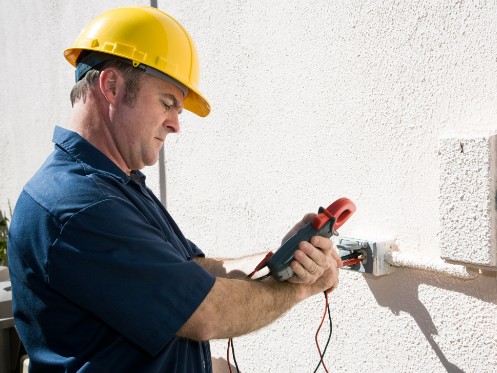5 Simple Steps for Becoming a Licensed Electrician

Becoming a licensed electrician can be a great career choice. Licensed electricians are always in high demand, so you will usually never have any issues finding work. Electricians are also well-paid, and most electrical companies offer good benefits to their employees. If you are considering becoming an electrician, here is a handy guide that shows you all of the necessary steps you’ll need to take along the way.
1. Earn Your High School Diploma or Your GED
Before you can even consider getting trained to become an electrician, you’ll first need to have a high school diploma or a GED. Almost all electrical apprenticeships and training programs require a person to be at least 18 years old and have completed their high school diploma. If you didn’t complete high school, you will need to study for and pass the GED (General Education Diploma) exam to prove that you have all of the relevant knowledge that comes with a high school education.
A high school education provides important skills that are necessary to work as an electrician, including math and some basic science concepts. One of the most important parts of being an electrician is being able to read and understand technical documents like blueprints, schematics and instruction manuals, which means it’s also important that you have good reading and comprehension skills. Some of the subjects that can help you most on your path to becoming an electrician include algebra, trigonometry and physics. Taking a course on drafting or mechanical drawing can also be extremely useful by helping you better understand how to read plans and blueprints that you’ll encounter on an almost daily basis when working as an electrician.
2. Start Your Electrician Training
You don’t need a college degree or any other type of formal education other than a high school diploma to become an electrician as most electrical apprenticeship programs will accept candidates without any previous training or experience. However, if you’re really serious about working as an electrician, you may want to consider enrolling in a trade or vocational school as this will provide you with lots of additional knowledge so you’re better prepared when you start your apprenticeship. Many community colleges also offer a two-year associate degree in electrical technology, and this is one of the most popular routes taken by many future electricians.
3. Join an Electrical Apprenticeship Program
Whether or not you enrolled in a trade school or got your associate degree, you will usually need to become an electrical trainee and join an electrical apprenticeship program to start on your path to becoming a licensed electrician. The apprenticeship program will place you with an electrical contractor where you will then work alongside and shadow a certified journeyman or master electrician. This is important as you will be required to have a certain number of hours of on-the-job training before you can take the test to become a certified journeyman electrician.
Most states also require you to have a certain number of hours of classroom training before you can take the test, and this is another reason why you may want to enroll in a trade school or take classes at a community college as this will help you meet the education requirements. The number of hours of on-the-job training and classroom education you’ll need to take the journeyman electrician test varies from state to state as each state has its own licensing and certification requirements.
In our state, the Washington State Department of Labor and Industries (WDLI) is the agency responsible for certifying electricians and issuing electrician licenses. WDLI requires that anyone who wishes to become a licensed electrician first enrolls with the agency as an electrical trainee and completes a state-approved apprenticeship program. Before you can take the journeyman electrician exam, you must first complete a minimum of 8,000 hours of on-the-job training working under a licensed electrician and at least 96 hours of classroom education. If you work 40 hours every week, it will take you just under four years before you have the required work experience to be eligible to sign up for the journeyman electrician exam.
4. Take the Journeyman Electrician Exam
Once you’ve met all of the licensing requirements, you will then need to apply and be approved by the state to sign up for the journeyman electrician exam. This exam consists of 77 questions that cover a wide range of topics. To pass the exam, you will need to show that you have a working knowledge of the National Electric Code, the relevant state electrical codes and laws and at least a decent grasp of math and basic electrical theory. Candidates will successfully pass the exam if they receive a score of 70% or higher on every section of the test, and you will usually receive your score the same day you take the exam. Once you’ve passed the exam, you will then receive your license from the state and can begin working as a journeyman electrician.
Once you’ve been approved by the state to take the exam, you have exactly one year from the date of the approval to pass every exam section. If you don’t receive a passing grade in every section on your first attempt, you will need to wait at least 14 days before you can take the test again. Should you fail the test three times or more, you will need to wait 90 days from the date of the most recent failed test before you can try again. If you don’t pass the exam within one year of your approval, you will need to reapply with the state and be reapproved before you can test again.
5. Become a Licensed Master Electrician or a Licensed Electrical Administrator
Earning your journeyman electrician license allows you to do lots of different types of electrical work on your own, but the majority of journeyman electricians will go on to get their master electrician license or an electrical administrator license. To be eligible to take either the master electrician or electrical administrator exam, you will first have to work for a licensed electrical contractor with your journeyman license for at least four years.
A journeyman electrician license is valid for three years, so you will need to reapply for your license while working your way to obtain a higher license. Before you can reapply for your journeyman license, you will need to complete a minimum of 24 hours of continuing education courses. In Washington, you need at least eight hours of education covering changes to the National Electric Code and four hours of education covering the most recent state codes and laws. The remaining 12 hours of continuing education can be obtained by taking any state-approved course.
Once you’ve worked as a journeyman for four years, you can again apply with the state to take the master electrician exam consisting of 100 questions or the electrical administrator exam consisting of 92 questions. As with the journeyman exam, these two tests require you to receive at least a 70% score on each section to pass. Once you’ve passed either of these two exams and received your license, you’ll then be able to become a state-licensed electrical contractor and run your own business should you wish.
At Brennan Electric, we’re proud to be the best and most highly rated electrical contractor in the Seattle and Puget Sound area. We’ve been serving our community for more than 30 years, and our team of licensed journeyman and master electricians is always ready to take care of all of your home’s electrical installation, inspection and repair needs. For more information on the electrical services we offer, contact us today.

